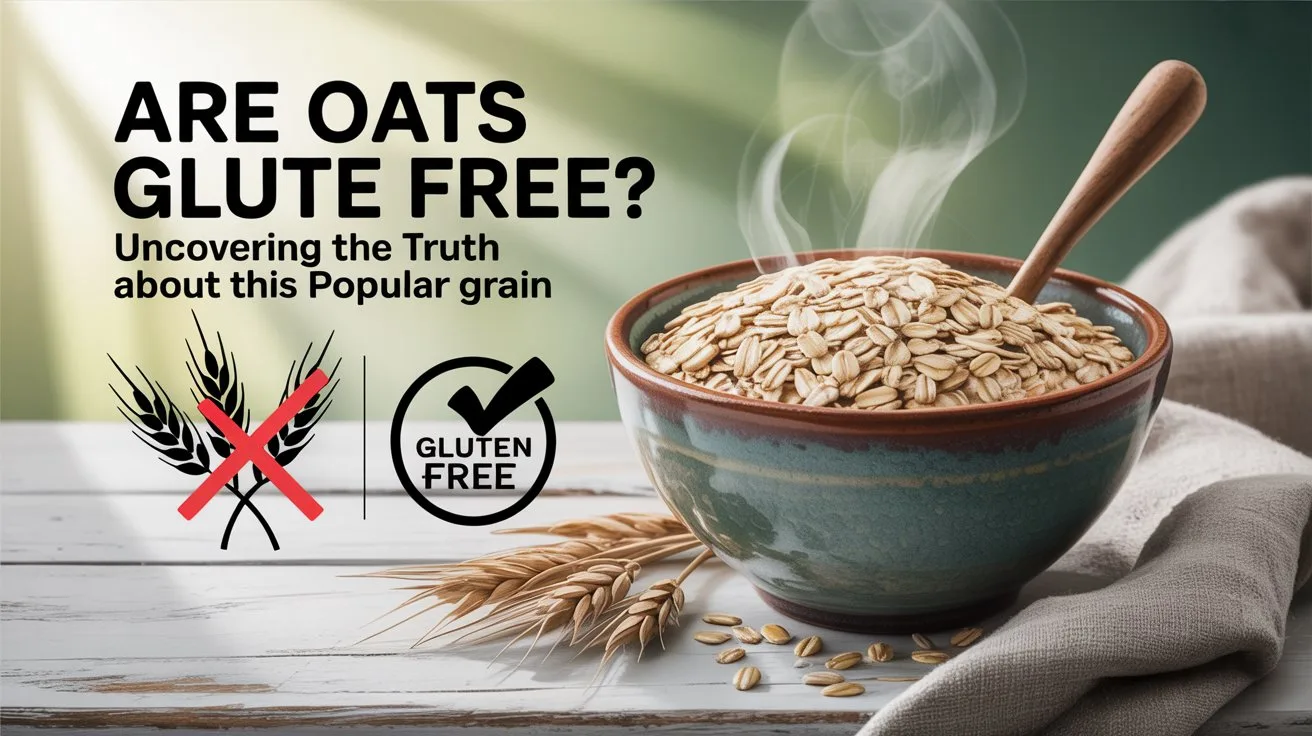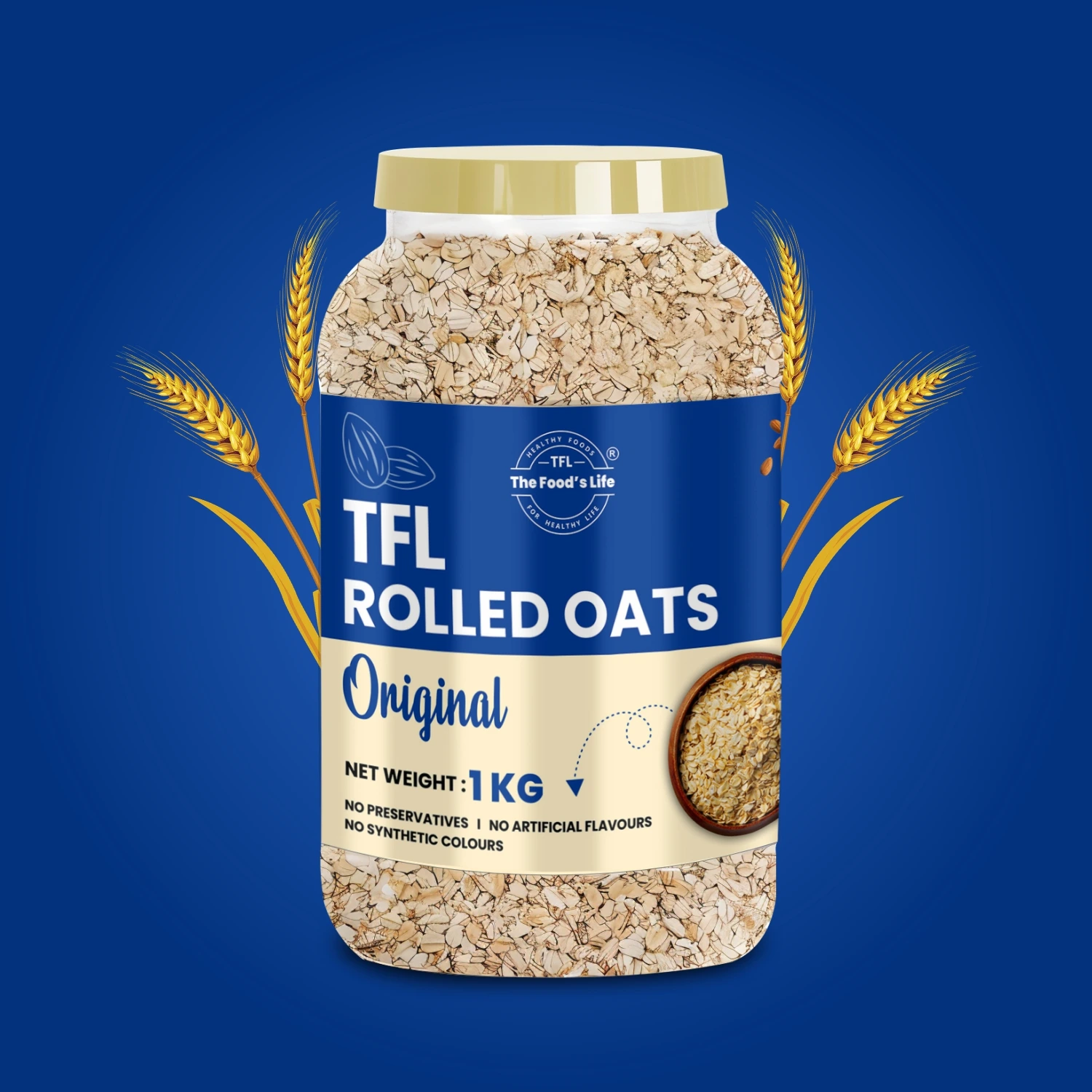Oats are one grain that is consumed often and considered a staple food in healthy diets across many cultures and humankind. Oats are incredibly nutrient packed with fiber, minerals, and antioxidants. For anyone with celiac disease or gluten intolerance, one of the important questions is, Are oats gluten free?
By nature oats are gluten free food, the oat grain itself does not contain gluten. The challenge comes from how oats are processed. Many processed oats are grown and packaged close to wheat, barley and rye, and so cross contamination is common. In actual fact, not all oats are gluten free unless they have the gluten free label.
For this reason, the easiest way to be safe is to look for gluten free certified oats. These oats are grown and handled in certified gluten free facilities. If you're wondering what oats are gluten free, the most clear information comes from the brands that say certified gluten free on the label.
In summary, oats can be a part of a gluten free diet, if sourced properly. They are an excellent source of fuel, they aid with digestion and they provide prolonged fullness - they can be a very powerfully nutritious and gluten free, safe grain for many if handled appropriately.tod overall health and isoliebaceous and by maintaining indulgent products standards.
Understanding Gluten and Why It Matters in Your Diet
Gluten is prevalent in contemporary diets, particularly for individuals who often have issues with food sensitivities, intolerances, allergies, or celiac disease. The goal is to understand what gluten is, what people avoid for health reasons, and where oats fit into the gluten-free picture.
What is gluten and why avoid it?
Gluten is a naturally occurring protein found in wheat, barley, and rye. Gluten helps dough rise and gives it an elastic and chewy texture. This is why gluten is so prominent in breads, pastries, and pasta.
Reasons for avoiding gluten:
- Celiac disease–celiac disease is an autoimmune condition in which gluten will cause damage to the lining of the small intestine.
- Gluten sensitivity–people who do not have celiac disease can often still experience symptoms such as bloating, headaches, and fatigue.
- Wheat allergy–some people are allergic to gluten grains.
For these individuals, the consumption of gluten, with even traces, can cause discomfort or health issues, which is why gluten free is so vital to the way they eat.
How gluten affects those with celiac disease and sensitivity
Celiac disease requires a strict gluten-free diet. When someone with celiac disease eats gluten:
- The immune system attacks the small intestine.
- This can result in nutrient malabsorption, chronic intestinal issues, anemia, osteoporosis and fatigue.
In comparison, non-celiac gluten sensitivity may not physically harm the intestine the same way, but still causes:
- Bloating
- Brain fog
- Abdominal cramping
- Emotional ups and downs
For either individual, exclusion of gluten from the diet can provide meaningful improvements to health and reduce any serious complications in the future.
Are oats gluten free foods by nature?
Yes, technically. Oats are gluten free foods by nature.
- Oats have neither wheat, rye or barley protein.
- Oats do contain avenin, a gluten-like protein, but it generally does not cause a response for most people who have celiac disease.
However, there is a large caveat:
- Most oats are processed in facilities with gluten-containing grains.
- This leads to cross-contamination and most conventional oats are not safe for gluten sensitive persons.
To enjoy oats safely:
- Choose "Certified Gluten Free" brands.
- These oats were grown, processed and packaged in gluten free environments.
Are Oats Gluten Free by Default or Only When Certified?
Oats are well-known as a whole grain that contains fiber and is heart-healthy. However, when we turn to the topic of gluten, things get muddled—are oats gluten free by themselves? Or are they gluten free only when stated? This really comes down to both their biological make-up and how they are handled in the processing stream.
The natural composition of oats: are all oats gluten free?
- Yes, oats, by default, are gluten free. Oats do not contain the gluten proteins found in wheat, rye, or barley.
- However, that does not mean that all oats are gluten free, especially when purchased commercially.
- The vast majority of oats that can be purchased were processed in shared facilities, which often results in contamination from gluten containing grains.
That is why if you have celiac disease or a gluten sensitivity, it is imperative to use certified gluten free oats, so as not to expose yourself to gluten cross-contact.
Avenin vs. gluten: understanding oat proteins
- Oats contain a protein called avenin, which resembles gluten structurally but is biologically different.
- Most people with coeliac disease or gluten intolerance tolerate avenin just fine.
However, a small fraction of coeliacs (estimated 1-5%) may react to avenin; this is why you should be aware of individual tolerances while introducing oats.
So, while oats are gluten free foods in a botanical sense, eating oats may require dietary caution because avenin is a potential risk in rare cases.
How oats can get cross-contaminated during processing
- The real risk is not oats, but how they are processed.
- Oats are often grown, harvested, and packaged using the same equipment as wheat or barley.
- Cross contamination occurs and makes a naturally gluten free grain potentially risky for someone with gluten sensitivity.
To be safe:
- Take "Certified Gluten Free" oats, which means they were tested to meet gluten free standards (usually < 20 ppm gluten).
- Look for oats from companies which had dedicated gluten free facilities to eliminate trace exposure.
What Oats Are Gluten Free and Safe to Eat?
If you're asking “are oats gluten free?”, the answer is both yes and no—it depends on how the oats are grown and processed. Oats are naturally gluten free foods, but only certified gluten-free oats are guaranteed safe for people with celiac disease or gluten sensitivity.
Certified gluten-free oats: what to look for
To ensure safety when buying oats:
- Look for the “Certified Gluten-Free” seal – This means the oats are processed in dedicated facilities that avoid cross-contamination.
- Read labels carefully – Just seeing “gluten free” isn’t enough. Reputable certifications and transparency from the brand are key.
- Check product packaging – Some brands will include detailed notes about their manufacturing practices and third-party testing.
When wondering what oats are gluten free, always check that they are certified, not just labeled gluten free casually.
Top brands that offer truly gluten-free oats
Here’s a table highlighting some top brands and their offerings for those asking “are all oats gluten free?” and looking for safe choices:These are examples of what oats are gluten free when sourced and processed safely.
How to read labels for safe oat purchases
If you're still asking “are oats gluten free foods I can trust?” here’s how to read oat packaging:
- Check the front and back of the package – Look for “Certified Gluten-Free” from reputable agencies (GFCO, NSF).
- Scan ingredient lists – Avoid any products that list “wheat,” “barley,” or vague “may contain” statements without certified assurance.
- Avoid bulk bin oats – Cross-contamination risk is high in open, shared environments.
The Benefits of Gluten-Free Oats in a Healthy Diet
For anyone asking are oats gluten free foods, the answer is yes—when they’re processed without contamination. Certified gluten-free oats bring powerful nutritional benefits to the table, especially for individuals managing celiac disease, gluten sensitivity, or those simply looking to boost their diet with wholesome grains.
Fiber and heart health: key benefits of oats
One of the standout features of oats is their high soluble fiber content, especially beta-glucan, which offers several heart-protective benefits:
- Lowers bad cholesterol (LDL): Beta-glucan binds with cholesterol-rich bile acids in the intestines and helps remove them from the body.
- Supports healthy blood pressure: Regular consumption of gluten-free oats may help maintain better vascular function.
- Promotes fullness: The fiber in oats keeps you feeling full longer, reducing the tendency to overeat and supporting healthy weight management.
If you're wondering, “what oats are gluten free and also heart-healthy?”, certified rolled or steel-cut oats from trusted brands like Bob’s Red Mill or GF Harvest are excellent choices.
Digestive wellness and blood sugar support
For people with digestive concerns, including IBS or gluten intolerance, gluten-free oats are particularly soothing:
- Gentle on the stomach: Oats are easy to digest and provide bulk to support regular bowel movements.
- Natural prebiotics: The fiber in oats feeds beneficial gut bacteria, improving microbiome diversity.
- Regulates blood sugar: The slow-digesting carbs in oats result in a lower glycemic response, helping stabilize blood sugar levels—especially helpful for people with diabetes or insulin resistance.
If you’re asking “are all oats gluten free?”, the answer is no. But those labeled as certified gluten-free oats ensure safety and quality for sensitive individuals.
Incorporating gluten-free oats into everyday meals
You can enjoy the health benefits of oats in a wide range of gluten-free dishes:
- Breakfast: Overnight oats, oatmeal, or gluten-free granola.
- Baking: Use oat flour in muffins, pancakes, or bread.
- Snacks: Create energy bites, oat bars, or add oats to smoothies.
- Main dishes: Use oats as a binder in veggie burgers or meatloaf.
So, are oats gluten free foods you can enjoy daily? Absolutely—if you're choosing properly certified products.
Are Oats Gluten Free Foods or a Hidden Risk? Know Before You Buy
Oats are often promoted as a healthy whole grain, but for individuals with celiac disease or gluten sensitivity, the question “are oats gluten free foods or a hidden risk?” is incredibly important. While oats are naturally gluten-free, how they're processed makes all the difference.
Understanding processing risks
Although the grain itself does not contain gluten, the risk lies in cross-contamination during farming, harvesting, milling, or packaging. Most oats are grown and processed in facilities that also handle wheat, barley, or rye, which can lead to gluten traces in the final product.
- Shared equipment is one of the primary sources of gluten contamination in oats.
- Airborne particles of wheat flour can settle on oats during processing.
So, while are oats gluten free by nature? Yes. But once they enter shared processing lines, the answer becomes more complicated.
Differences between labeled gluten-free oats and regular oats
To know what oats are gluten free, it's important to distinguish between standard oats and those labeled “certified gluten-free”:Certified gluten-free oats are grown, processed, and packaged in dedicated facilities. Brands like Bob’s Red Mill (Gluten-Free), GF Harvest, and Thrive Market’s gluten-free line are examples of safe oats for gluten-free diets.
Safe handling tips for sensitive individuals
If you're still wondering are all oats gluten free, the answer is no. But with a little awareness, oats can be a safe part of your diet. Here’s how:
- Look for certification from trusted sources like the GFCO (Gluten-Free Certification Organization).
- Store oats separately to avoid cross-contamination at home.
- Avoid bulk bins where cross-contamination risk is higher.
- When eating out, ask specifically if dishes use certified gluten-free oats.
FAQs
Q1. Are oats gluten free naturally?
Yes, oats are gluten free by nature, but they can be contaminated during processing with gluten-containing grains like wheat or barley.
Q2. What oats are gluten free and safe for celiacs?
Only certified gluten free oats are safe for people with celiac disease, as they are grown and processed in dedicated gluten-free facilities.
Q3. Are all oats gluten free without exception?
No, not all oats are gluten free. Regular oats may contain gluten due to cross-contact, so always look for the “gluten-free” label.
Q4. Are oats gluten free foods good for gluten-free diets?
Yes, oats are gluten free foods and a great addition to gluten-free diets—if they are certified and uncontaminated.
Q5. What are the best brands for gluten free oats?
Some top brands of gluten free oats include Bob’s Red Mill (gluten-free line), GF Harvest, and Thrive Market’s gluten-free oats.
Conclusion: Enjoying Oats Safely on a Gluten‑Free Diet
Oats are a nutritious, fiber-rich grain that can be part of a healthy gluten-free lifestyle—if chosen carefully. While oats are gluten free by nature, cross-contamination during farming or processing often introduces gluten from wheat, barley, or rye. That’s why not all oats are gluten free, and the safety of oats depends heavily on sourcing and labeling.
To confidently include oats gluten free foods in your diet, look for certified gluten-free oats from trusted brands. These products are processed in dedicated facilities, tested for safety, and labeled clearly. Understanding what oats are gluten free helps protect individuals with celiac disease or gluten sensitivity while still enjoying the many health benefits oats offer—from improved digestion to better heart health.
Ultimately, the answer to “Are all oats gluten free?” is no—but with the right knowledge and product choices, oats can absolutely be enjoyed safely and deliciously on a gluten-free diet.






